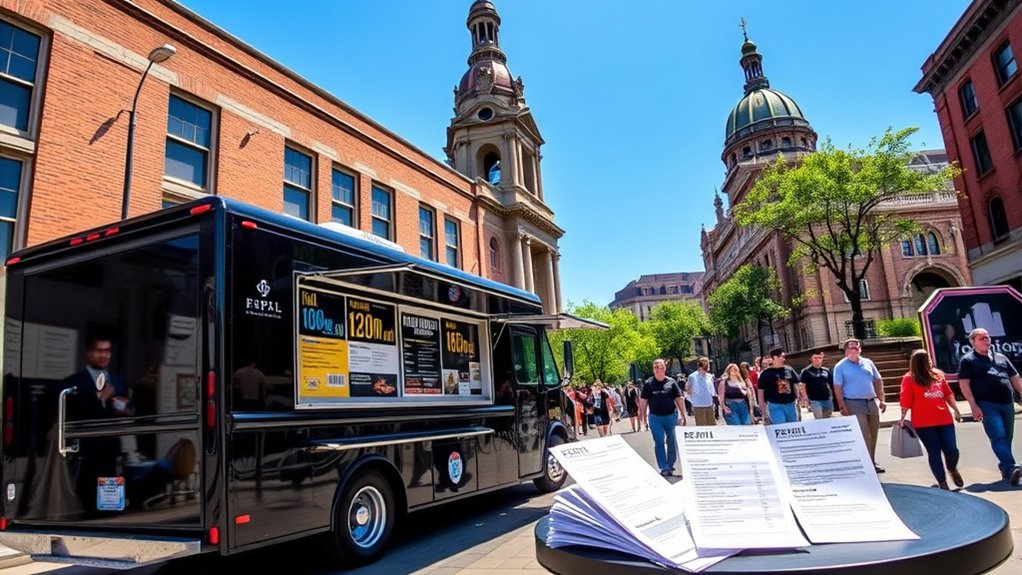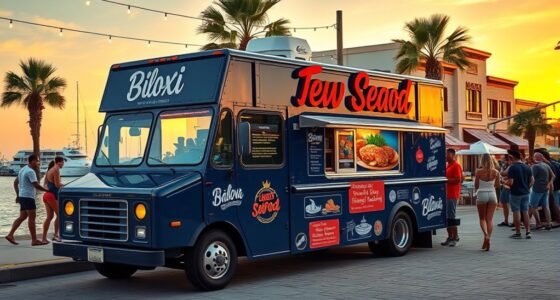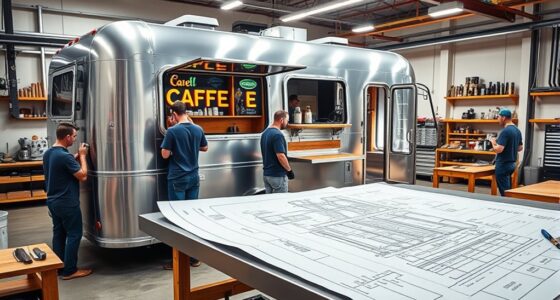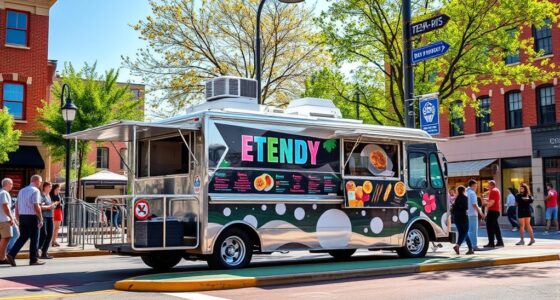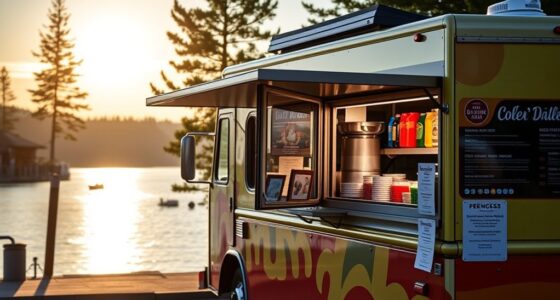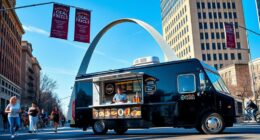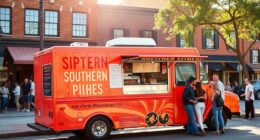To start your food truck in St. Paul, you’ll need to secure permits from city and state agencies, with costs typically ranging from $25 to $165, plus inspection fees. You must operate on public streets or private property with proper approval, using options like meter hooding for on-street parking. Planning a fast, high-quality menu and effective marketing through social media and local events will boost your success. Continue exploring to get all the details on managing regulations and strategies.
Key Takeaways
- Obtain necessary licenses from the Minnesota Department of Health or Agriculture, with fees ranging from $55 to $165, plus additional permits for street operations.
- Secure permits for street or private property locations, including Right-of-Way permits, and schedule inspections for fire safety, electrical, and health compliance.
- Operate primarily on public rights-of-way with proper parking permits, meter hooding, and adherence to local zoning, safety, and noise regulations.
- Focus on high-quality, quick-prep menu items (8-15 options) with seasonal ingredients, and leverage social media and local events for marketing.
- Ensure ongoing compliance with licensing, health, and safety standards to prevent fines, permit revocations, or operational shutdowns.
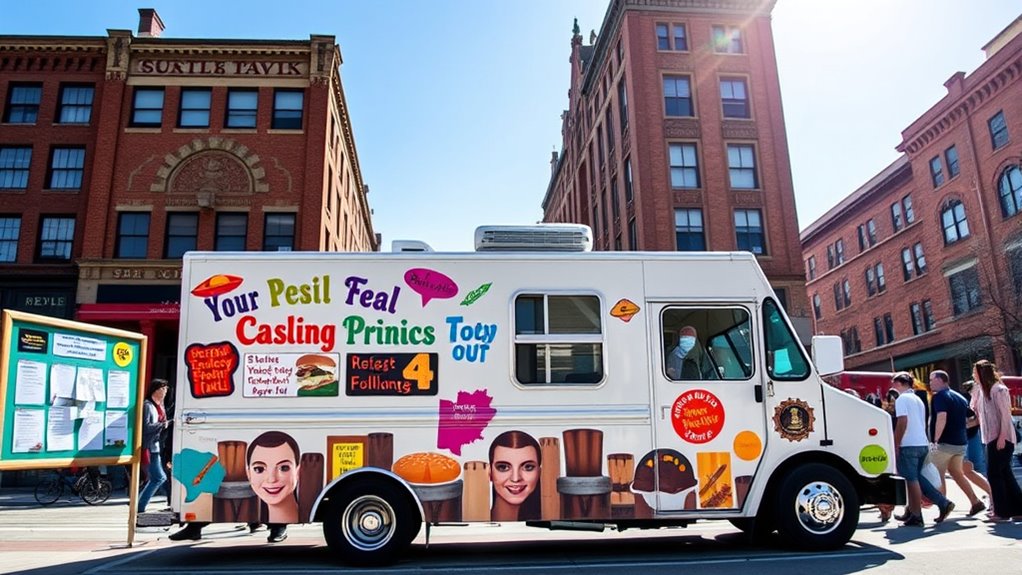
Understanding licensing and permits in St. Paul can seem complex, but grasping the process helps you stay compliant. You’ll need licenses from the Minnesota Department of Health or the Minnesota Department of Agriculture, depending on your menu. The city requires you to meet state health codes and possibly obtain multiple licenses if you serve different types of food. Before you start, submit your plans and equipment details at least 30 days prior for approval. A preoperational inspection is scheduled 14 days before opening, which is necessary to get your license. If you plan to operate on public streets, you’ll need a Right-of-Way permit from Public Works. For private property or special events, additional permits and zoning reviews may be required. The licensing process in North St. Paul also includes an online Fire Department Safety Inspection, which is essential for approval. Ensuring your compliance with health codes and other regulations from the outset will help prevent delays and streamline your approval process. Staying organized guarantees a smooth licensing process.
Understanding Costs and Fees for Mobile Food Vendors
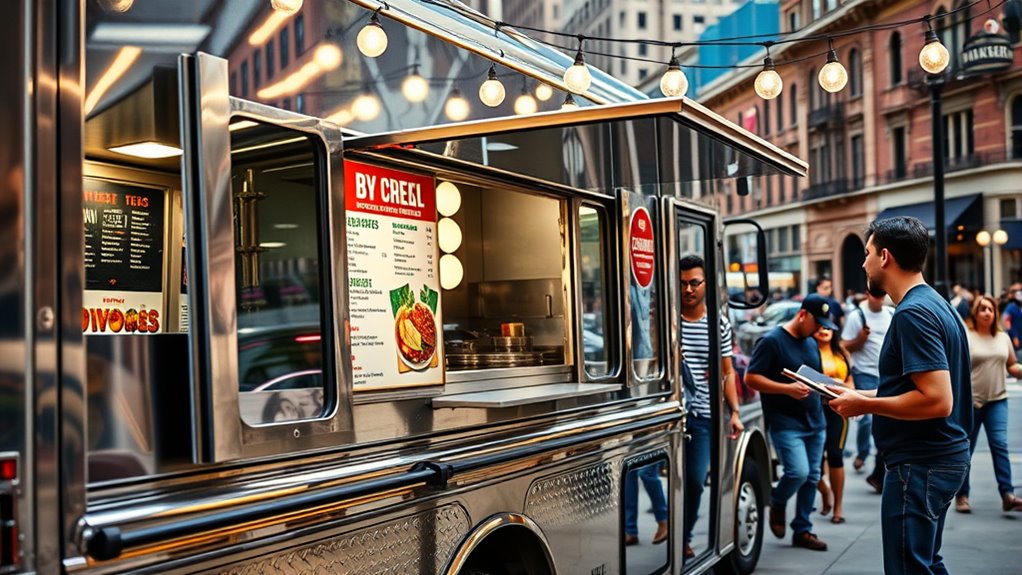
Understanding the costs and fees for operating a food truck in St. Paul is essential for budgeting effectively. You’ll need to account for licensing fee structures, inspection and plan review costs, and any parking or special permits required. Being aware of these expenses helps you plan your finances and avoid surprises down the road. Additionally, permit costs vary widely depending on the city’s regulations, so researching local requirements beforehand can prevent unexpected expenses. Considering the water safety requirements for food trucks, including proper sanitation and water use, can also impact your compliance costs.
Licensing Fee Structures
Licensing fee structures for mobile food vendors in St. Paul vary based on license type, duration, and additional costs. You might pay $25 daily or up to $300 annually, depending on your operation. Some municipalities include Fire Department Safety Inspection fees in the overall license cost, while others charge separately. Starting January 2025, the Minnesota Department of Agriculture adds a 5% surcharge with a minimum of $5 on all fees. You’ll also need to budget for application fees, like the $50 Food Handler License. Payment is required with your application and proof of insurance. Fees are non-transferable and often require renewal annually, with costs similar to your initial license. Here’s a quick overview: In Anoka, regulations restrict food truck operations mostly to residential districts, with specific exceptions for breweries and special events, which influences licensing and operational procedures. Additionally, many cities require a comprehensive permit process that may involve multiple departments and inspections to ensure compliance with local health and safety standards.
Inspection and Plan Review Costs
Are you aware of the costs involved in inspection and plan review processes for your mobile food vendor license? Fire department inspections are included in the license fee but require scheduling with inspectors. If you fail, you can’t operate until corrections are made. These inspections focus on fire safety, such as suppression systems and cooking equipment. Electrical inspections cost $80 per hour and must be completed annually before operation, with reinspection fees applying if repairs are needed. For plan review, you’ll need vehicle inspection reports and safety plans, which you arrange by contacting Saint Paul Licensing. Reinspections may be necessary if regulations aren’t met initially. These costs guarantee your truck complies with safety standards, preventing delays and additional expenses during your launch process.
Parking and Special Permits
Operating a food truck in St. Paul means understanding parking rules and permits. You must follow street parking restrictions and operate only on public rights-of-way adjacent to commercial zones. You can park at metered spots once, but you need to “plug” the meter for the allotted time and move afterward. During special events, organizers can apply for meter hooding permits, allowing food trucks to park without paying meter fees. You can’t set up tables, chairs, or utilities on streets or sidewalks. To legally operate, you need relevant licenses from state agencies, with fees depending on your sales volume. Additional costs include insurance, background checks, and permits for festivals. Ensuring compliance helps you avoid fines or shutdowns and keeps your food truck running smoothly. Be aware that regulatory compliance challenges may arise with new or changing rules, so staying informed can prevent legal issues.
Finding the Right Locations and Operating Guidelines
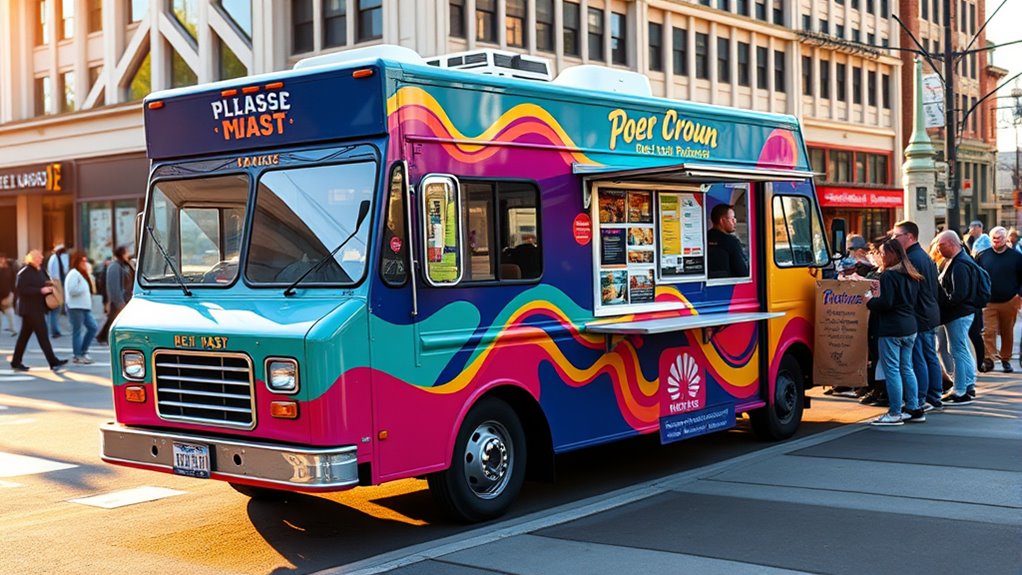
To find the right spots for your food truck, you need to follow St. Paul’s zoning and parking rules, ensuring you operate only on streets adjacent to permitted commercial areas. You’ll also need to secure event permits or meter hooding permits if you plan to set up during special occasions. Keep in mind that operating near entertainment venues or within certain distances from intersections and festivals requires special permissions. Additionally, all mobile food units must comply with local licensing and health regulations, which can influence where and how you operate. Understanding the sound impact of your food truck setup can also be important when coordinating with local noise ordinances.
Zoning and Parking Rules
Navigating zoning and parking rules is essential for food truck operators in St. Paul. You can operate on private property in zones like T2, T3, T4, B2-B5, and industrial zones. If your truck occupies over 10% of a lot or exceeds 1,000 sq ft (except in I2 zones), you’ll need a conditional use permit. Placement must avoid blocking parking, loading zones, or pedestrian paths. You need property owner permission, especially on public or private land. Additionally, understanding local regulations helps ensure compliance and smooth operation.
Event and Meter Permits
Securing the right locations for food trucks during events involves understanding permit options like meter hooding. Meter hooding permits let you reserve on-street parking meters next to event sites, giving you exclusive access and preventing meter expiration. This guarantees you can stay parked for the event’s duration without relocating. To obtain a meter hooding permit, you need to coordinate with City of St. Paul authorities before the event begins. Additionally, you must follow operating guidelines, such as parking only where permitted, avoiding obstructions, and not placing tables or generators on streets or sidewalks. All permits and licenses, including those for special events, must be secured in advance, with applications submitted at least 14 to 30 days prior. Proper planning ensures compliance and smooth operation during your event.
Planning Your Menu and Food Preparation Strategies
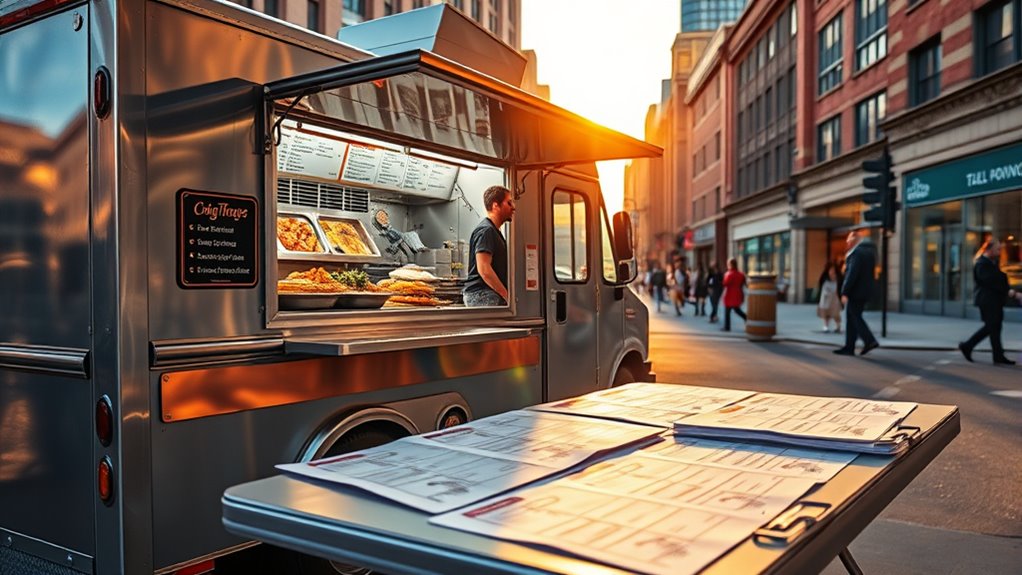
When planning your menu and food preparation strategies for a food truck, focusing on a limited selection of high-quality items guarantees quick service and maintains your brand’s identity. Keep your menu between 8-15 items, emphasizing specialties rather than broad cuisines to ensure consistency and food quality. Use seasonal ingredients to keep offerings fresh, reduce costs, and encourage repeat visits. Start with a streamlined menu to improve preparation efficiency and quality control, rotating items regularly to keep things exciting. Choose dishes that can be prepped ahead of time or prepared in under five minutes to keep lines moving. Incorporate overlapping ingredients across multiple dishes to simplify inventory. Invest in kitchen equipment that supports fast cooking methods like grilling or microwaving, boosting speed and efficiency. Conducting market research by visiting local food markets can help identify popular items and inspire menu choices that resonate with your target audience. Additionally, understanding self watering plant pots can inspire innovative presentation ideas or eco-friendly packaging options that appeal to environmentally conscious customers.
Effective Marketing and Customer Engagement Tactics
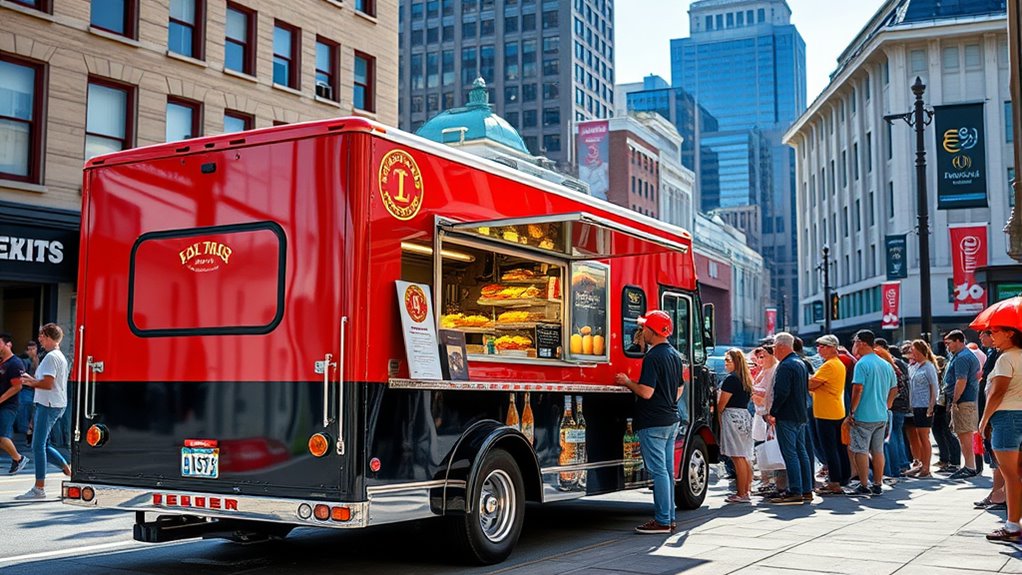
Effective marketing and customer engagement are essential for your food truck’s success in a competitive market. Social media is a powerful tool, with 68% of food trucks actively promoting their business online. Facebook leads the way, with 75% using it regularly, helping to drive a 20% sales boost for many. Customers tend to spend around 15% more at trucks that engage online. Participating in local events and festivals, which 80% of trucks do, boosts visibility and foot traffic. Loyalty programs are also crucial, increasing repeat visits by about 30%. Using digital tools like GPS tracking and mobile apps makes your truck more accessible. Tailoring content to younger audiences, emphasizing local sourcing, and leveraging hashtags can amplify your reach and foster lasting customer relationships. Incorporating Honda Tuning concepts such as vehicle customization and performance upgrades can also set your food truck apart by creating a unique brand experience that resonates with car enthusiasts and local communities.
Ensuring Compliance Through Inspections and Regulations
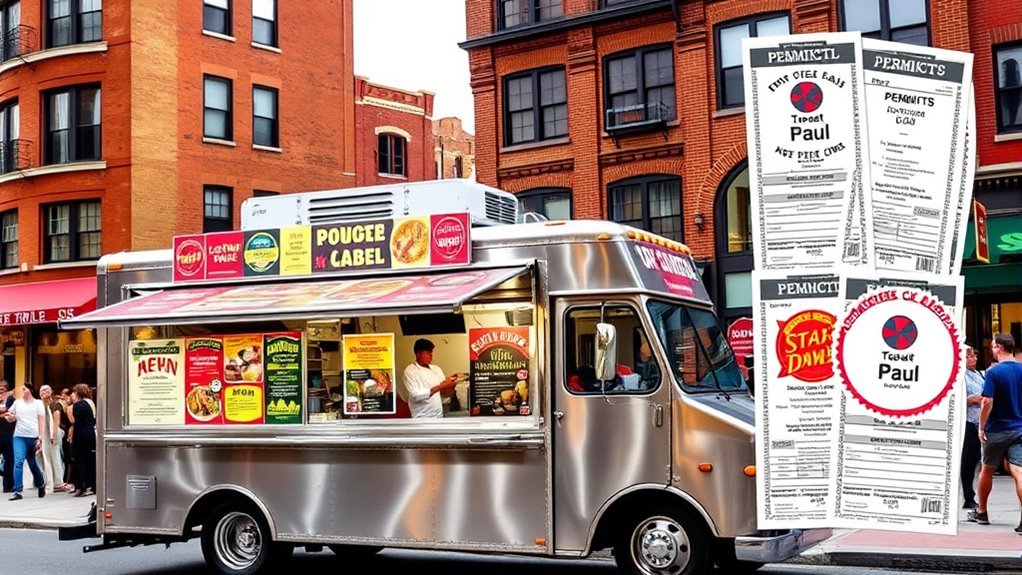
To operate legally and safely, your food truck must meet all licensing and permit requirements set by Minnesota authorities. You’ll need licenses from the Minnesota Department of Health or Agriculture, depending on your menu, costing between $55 and $165. A Food Handler License is required, and your truck must comply with Minnesota Food Code standards. Fire Department Safety Inspections are mandatory and included in some license fees. You must submit plans for review before construction or modifications. Regular inspections verify sanitation, safety, and equipment standards. Operating on public streets requires adherence to parking and zoning rules, with permits for private property or parkland. Ensuring compliance helps you avoid fines, permits revocation, or operation shutdowns, safeguarding both your business and customers. Additionally, understanding spoiled lemon juice signs can help ensure the quality and safety of ingredients used in your menu items.
Frequently Asked Questions
How Long Does It Take to Get All Necessary Permits Approved?
You’re wondering how long it takes to get all your permits approved. The timeline varies depending on inspection scheduling, application completeness, and any corrections needed after initial reviews. Typically, online applications expedite things, but delays can happen if inspections are delayed or issues arise. Expect the process to take a few weeks, especially if you need multiple inspections or additional approvals. Planning ahead ensures you get your permits smoothly and on time.
Are There Any Restrictions on Food Truck Sizes in St. Paul?
You might wonder about size restrictions for food trucks in St. Paul. While the city doesn’t specify maximum dimensions, your truck must comply with parking, zoning, and pedestrian safety rules. You can’t block sidewalks or drive aisles, and parking restrictions may limit your truck’s size. Keep in mind neighboring cities have height or length limits, so check local regulations to make sure your truck fits comfortably within the city’s operational guidelines.
Can I Operate Year-Round or Are Seasonal Limitations in Place?
You can operate your food truck year-round in St. Paul. There are no statewide seasonal restrictions for licensed mobile food units, and city rules support year-round street operation if you follow parking, health, and safety regulations. While harsh winter weather might impact customer traffic, it doesn’t legally prohibit your operation. Just guarantee you meet all licensing, parking, and safety standards, and adapt your menu and marketing for seasonal demand.
What Are the Specific Requirements for Fire Safety Equipment?
Think of fire safety equipment as the armor protecting your mobile culinary fortress. You need an automatic fire suppression system for open flames or grease vapors, inspected annually by certified technicians. Keep a Class K fire extinguisher nearby, and verify it’s inspected yearly. Install UL 1046 grease filters in your exhaust hood, and maintain proper ventilation. Secure LP gas cylinders, install alarms, and keep fire safety devices accessible at all times to prevent disaster.
How Do I Handle Permits for Special Events or Festivals?
When handling permits for special events or festivals, you need to submit your application at least 14 to 30 days ahead. Provide detailed event information, proof of insurance, and supporting documents. Coordinate with city departments like health, safety, and inspections to guarantee compliance. Remember, you may need multiple approvals, and restrictions like no sidewalk use or electrical obstructions apply. Always follow local guidelines for a smooth permit process.
Conclusion
Starting your food truck in St. Paul might feel like conquering a mountain—full of permits, costs, and rules—but with the right planning, you’ll turn those obstacles into stepping stones. Imagine your truck becoming the city’s legendary culinary beacon, drawing crowds from miles around! Stick to the guidelines, create a mouthwatering menu, and market like a pro. Before you know it, you’ll be ruling the streets and making food truck history in St. Paul!
